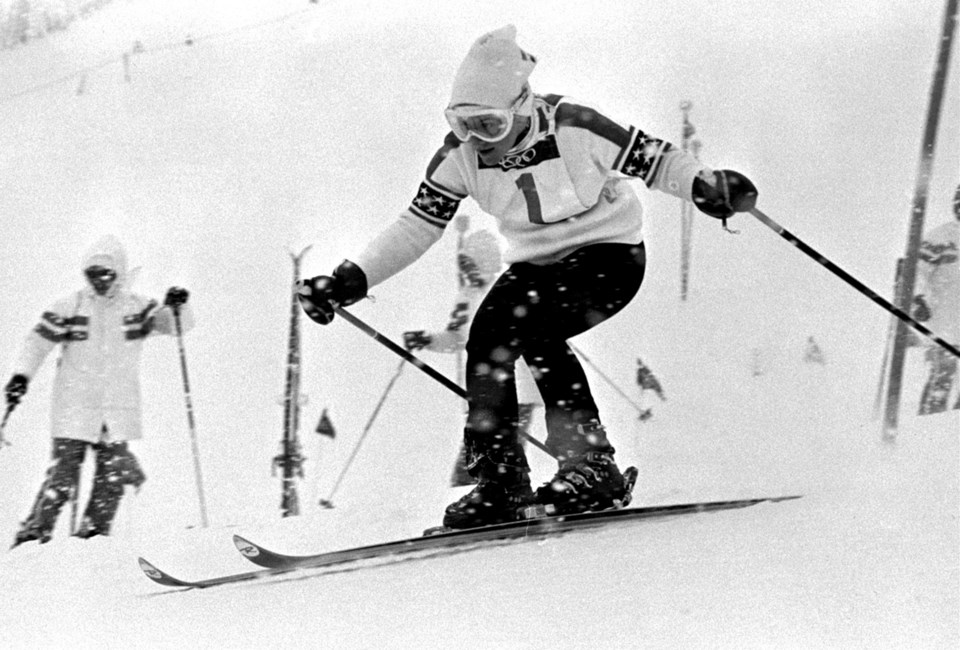BEIJING (AP) — For members of Vermont’s “Skiing Cochrans” clan, competing in an Olympics is a right of passage. A family tradition.
First there were siblings Marilyn, Bobby and Barbara Ann at the 1972 Sapporo Games, fulfilling a plan hatched by their parents, Mickey and Ginny Cochran, in the backyard ski area.
Then younger sister Lindy raced at the Innsbruck Games in 1976, grandson Jimmy was on the U.S. Ski Team in 2006 and 2010 and now Ryan Cochran-Siegle is at his second Olympics.
Fifty years after his mom, Barbara Ann, won the gold in slalom, Cochran-Siegle is contending for a medal in Sunday's men’s downhill — the opening event on the Alpine skiing program of the Beijing Games.
“It’s always cool when I go back home just talking about what it’s like and having that little sharing session,” Cochran-Siegle said.
So how was it growing up the son of an Olympic champion?
“She’s still just my mom,” Cochran-Siegle said. “Most of our conversations are pretty normal.”
That’s because modesty is also a Cochran tradition.
In a recent video interview, Barbara Ann said she didn’t even realize that this year marks the 50th anniversary of her victory until a reporter brought it up.
“I hadn’t even thought about that,” she said. “It’s been a long time.”
She hasn’t, however, forgotten what happened on Feb. 11, 1972.
“It was much harder for me to get up on the podium than it was to actually race,” Barbara Ann said. “I really enjoyed the racing. But I didn’t like all the attention that went along with it. I was really, really shy.”
Competitiveness was never an issue for Barbara Ann, though.
“Two years before I had come in second at the world championships and I saw the French flag being raised the highest and I didn’t like that,” she recalled. “So that was kind of like a seed that got planted for me that I wanted to win.”
Win she did — finishing ahead of two French women in Sapporo.
“It was close. I won the first run by three hundredths and lost the second run by one hundredth and overall won by two hundredths,” Barbara Ann said.
Sunday’s race could be a close one, too.
On a completely new course with perfectly packed man-made snow that should enable skiers to attack from top to bottom, the difference between winning and missing out on the medals could be a matter of miniscule margins.
For Cochran-Siegle, just being at the Beijing Games is an achievement after he was the victim of a horrifying crash on the feared Streif course in Kitzbühel, Austria, a year ago. A fracture of the seventh cervical vertebra of his spine meant that he didn’t get back on skis until May and didn’t resume full training until August. Then he made the risky decision to switch ski brands.
A fourth-place result in a super-G in Bormio, Italy, in December marked a return to form in a race where he had posted his first World Cup victory a year earlier in what was a breakout season — until his injury.
Also in December 2020, Cochran-Siegle finished second in a downhill in Val Gardena, exactly a half-century after his mom won a silver medal in the world championships at the Italian resort.
Perhaps concerned with the weight of family history, Barbara Ann wrote a letter to her son before he competed in the 2018 Pyeongchang Games, telling him that “medals are really, really nice but it’s not all about the results.”
“Enjoy the time that you’re there and be proud of the fact that you’re representing the U.S,” she wrote. “And then you just go and you do your best.”
In Pyeongchang, Cochran-Siegle's best finish was 11th in giant slalom.
“It will be a different experience this Olympics for him ... He knows he’s one of the top Americans, if not the top guy,” Barbara Ann said. “But definitely there’s some potential on the U.S. men’s team.”
In Val Gardena this season, Bryce Bennett won the downhill for his first career World Cup victory. That came weeks after Travis Ganong, another American, took third in a super-G in Beaver Creek, Colorado.
Strong winds forced the of the third and final downhill training session on Saturday after only three racers had come down. Wind will also likely be a factor on race day.
“I’m putting it down tomorrow,” said the 6-foot-7 Bennett, who is rooming with Cochran-Siegle in the Athletes’ Village. “We’re pretty opposite. He’s Vermont, I’m from California, but we actually get along really well.”
Barbara Ann described her son as “a perfectionist.”
“He studies the videos a lot and he really thinks about what it is that he’s trying to do and stuff,” she said, warning that he sometimes risks taking it “too far.”
Mom should know — because she’s also a mental coach for athletes. Although she doesn’t offer any coaching to Ryan or other family members.
“They see me as mom,” she said. “They don’t want to see me as a mental coach.”
At 71, Barbara Ann still skis. But she plans to retire from her main job this year as director of the ski school at Cochran’s ski area.
Who knows, maybe by the time she retires there will be another Olympic medalist in the family.
___
More AP Olympics: https://apnews.com/hub/winter-olympics and https://twitter.com/AP_Sports
___
Andrew Dampf is at https://twitter.com/AndrewDampf
Andrew Dampf, The Associated Press

